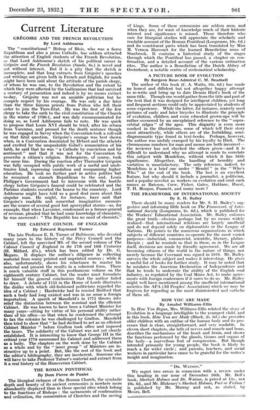The late Professor E. R. Turner of Baltimore, who devoted
many years to the history of the Privy Council and the Cabinet, left the unrevised MS. of the second volume of The Cabinet Council of England in the 17th and 18th Centuries (H. Milford, 47s.), which has been edited by Dr. G. Megaro. It displays the author's diligence in collecting maEeria1 from many printed and unprinted sources ; while it also, unfortunately, shows his reluctance to master his material and present the results in a coherent form. There is much valuable stuff in this posthumous volume on the eighteenth century Cabinet, but the reader must formulate for himself the general conclusions that the author failed to draw. A debate of 1753 in the House of Lords illustrates the dislike with which old-fashioned politicians regarded the idea of a Cabinet ; Hardwicke had to remind Bedford that Such a body had long existed and was in no sense a foreign importation. A speech of Mansfield's in 1775 throws into relief the distinction between the nominal and the efficient Cabinet. He was known to have been a Cabinet Minister for many years—sitting by virtue of his personal ability rather than of his office—so that when he condemned the attempt to tax the colonies he was challenged by Grafton. Mansfield then tried to show that "he had declined to act as an efficient Cabinet Minister" before Grafton took office and imposed the taxes. The solidarity of the Cabinet was not yet clearly established. It is interesting to know that George III in the critical year 1779 summoned his Cabinet and addressed them as a body. The chapters on the work done by the Cabinet as a whole and by the "inner group" of Ministers are in- structive up to a point. But, like the rest of the book and the editor's bibliography, they are incoherent. Someone else will have to take Professor Turner's material and extract from it a real history of the Hanoverian Cabinet.


























 Previous page
Previous page